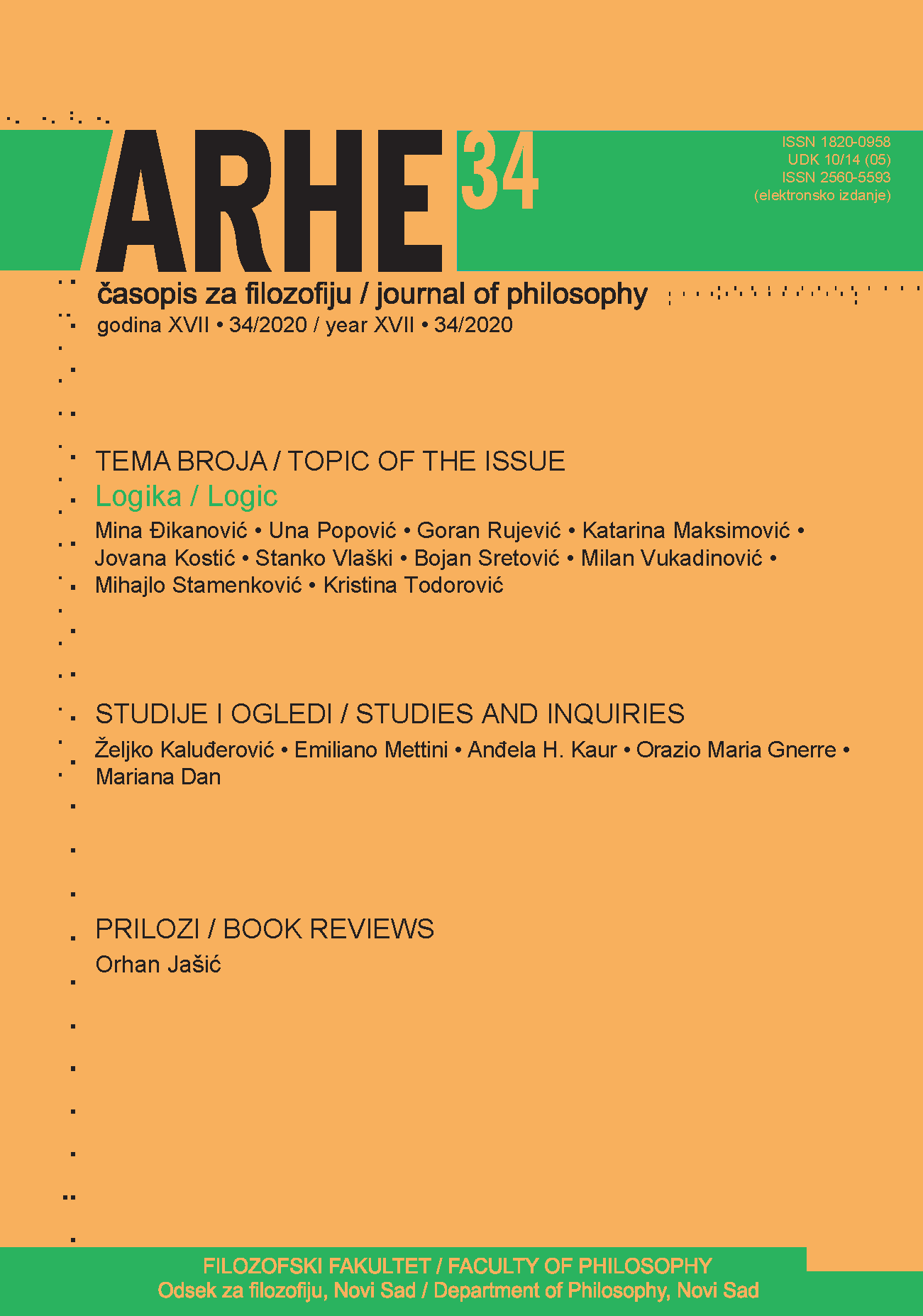UNDER AN UNSTARRY SKY: KANTIAN ETHICS AND RADICAL EVIL
Main Article Content
Abstract
Kantian ethics and concept concerning “radical evil” represent one of the most interesting facets of moral reflection of German philosopher. Using anthropological and philosophical approach based on well-known critical method, I. Kant tried to find a comprise between “natural” behavior (i.e. not regulated by synthetic a priori judgments) but based only on sensation of pleasant unpleasant and “rational” behavior when humans tried to exit the realm of appearance and personal egoism for entering a new ethical dimension based on right (not pathological, if using I. Kant’s word) maxims being able to make human beings better than they are. In the paper it is underscored that main goal of Kantian ethics is the creation of a community where religion is a fact of reason and not of faith and reason, having as main actors men reaching an high level of self-consciousness and virtue that I. Kant granted as the greatest happiness one can have. The author tried to highlight the passage from “human being” as individuum (representative of a species) to ethically autonomous member of social consortium using as sources different Kantian works where this problem has been studied deeply and gave great emphasis to story of Job, representing in the best way the passage the Author wrote of. At the same time, he set for himself the goal of exploring progressive character of Kantian ethics aimed at making human beings better than they are, but not the best, considering noumenic nature of ethics hidden in the “Realm of goals”. Given such assumptions, the Author leads a debate with scholars distorting Kantian ethical thought by interpretation from Lacanian standpoints so that those scholars made I. Kant original source of totalitarianisms, where, in scholars’ opinion, humans do their duty both for saving their lives and express their sadistic tendencies and makes clear that Kantian ethics, throughout contradictory and complicated, is oriented to correction and education of human behavior for saving humans being from their own passions.
Article Details
References
Бадью, А. Этика: Очерк о сознании Зла. СПб.:Machina, 2006 — 126 с.
Broad, C. D. Broad's critical essays in moral philosophy. London: Allen and Unwin/New York: Humanities Press, 1971. 370 p.
Canetti, E. Crowds and power. N.Y. The Continuum Publishing Corporation. 1962. 467 p.
Челышев, П. В. Диалектика обыденного и специализированного сознания// П.В. Челышев/ Исторические, философские, политические и юридические науки, культурология иискусствоведение. Вопросы теории и практики. Тамбов: Грамота, 2017. № 5(79) C. 198-201. ISSN 1997-292X.
Dostoevsky, F. The Brothers Karamazov. https://www.planetebook.com/the-brothers-karamazov/ Accessed 06.08.2020
Frierson, P.R. 2007. Providence and Divine Mercy in Kant's Ethical Cosmopolitanism.// Faith and Philosophy: Journal of the Society of ChristianPhilosophers. Vol. 24, Issue 2, Article 3. P. 144-164.
Гулыга, А. В. М., Мол. гвардия, 1981. — 303 с., ил. (2-еизд.).
Horkheimer M., Adorno Th. Dialectics of Enlightenment. Philosophical fragments. Stanford, California: Stanford University press, 2002. 284 p.
Jung, C. G. Answer to Job. Extracted from Psychology and Religion: West and East, Vol. 11 of the Collected Works of C. G. Jung. Princeton University Press, 1956. 167 p.
Kant, I. Religion within the Boundaries of Mere Reason. Religion within the Boundaries of Mere Reason and other writings. Cambridge: Cambridge University Press. 1998. 230 p.
Kant, I. On the miscarriage of all philosophical trials in theodicy. Religion within the Boundaries of Mere Reason and other writings. Cambridge: Cambridge University Press. 1998. 230 p.
Кант, И. О воспитании./ И. Кант: Трактаты и письма. М.: Наука, 1980 ― 709 с.
Leibniz, G. Theodicy: Essays on the Goodness of God, the Freedom of Man, and the Origin of Evil Edited with an Introduction by Austin Farrer, Fellow of Trinity College, Oxford. Translated by E.M. Huggard from C. J. Gerhardt’s Edition ofthe Collected Philosophical Works, 1875-90. Bibliobazaar, Charleston, 207. P. 444.
Rangelov, I. 2003. Ideology in between radical and diabolical evil: Kant’s «ethics ofthe Real» // Facta Universitatis. Vol. 2, № 10. P. 759-768.
Spinoza, B. Tractatus theologico-politicus. Exported from Wikisource on 09/08/20
Столович, Л. Н. Аксиологический подход к эстетическим категориям в эстетическом учении Иммануила Канта//Л.Н. Столович/ Эстетика Иммануила Канта и современность: Сборник статей по материалам V Кантовских чтений. Калининград—Светлогорск, 1990 год (ред. А. С. Батюшкова). С. 40-48.
Редактор и составитель — А.С.Батюшкова
М.: Знание, 1991. — 64 с.
Жижек, С. 2008. Устройство разрыва. Параллаксное видение. М. : Европа. 516 с.
Жуков, В.А. Мировоззренческое значение «Критики способности суждения» в философии Канта// TELEOLĢIJA UN ESTETIKA, Riga, 1990. C 8―24.
Zimbardo, Ph. The effect Lucifer. Understanding How Good People Turn Evil. The Random House Publishing Group, 2007. 551 p.
Яркеев, А.В. Кантианская концепция радикального зла и ее предел: Этико-политические импликации// А.В. Яркеев/Научный ежегодник Института философии и права Уральского отделения Российской академии наук. 2016. Том 16. Вып. 1, с. 5–19.
